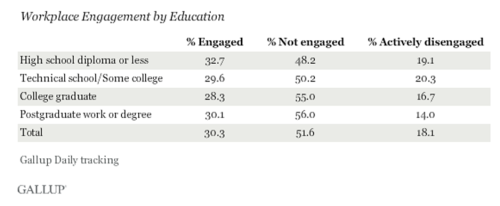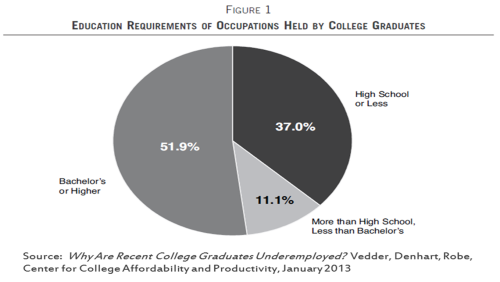Recent headlines from Gallup proclaiming that college-educated Americans are less engaged on the job than other cohorts may have spurred some conversation among HR leaders and professionals.
Engagement, that elusive component to organizational success, is the Holy Grail many employers chase. And Gallup, the grand surveyor of people on all topics, has regularly published engagement data that either convinces us that engagement is a fraud or that we have to try harder to win over our workforces.
A recent USA Today article (Does higher education mean lower joy on job?) quoted Gallup findings as well as findings from this report (Why Are Recent College Graduates Underemployed?) from the Center for College Affordability and Productivity. The justaposition of these two sources shows an interesting picture.
Why are college educated the least engaged?
Here’s Gallup’s data:
So, according to Gallup, the most engaged group of workers are those who have earned a high school diploma or less. And the least engaged group of workers are those who have earned a college degree.
By themselves, the numbers are almost interesting. By themselves, the bigger news is that the numbers show that less than a third of the workforce is engaged, and more than two-thirds of the workforce is either not engaged or actively disengaged.
OK, that’s interesting and cause for concern.
Maybe they’re just bored on the job
But put this Gallup data into the blender with this data from the Center for College Affordability and Productivity and it gets a little more interesting:
If nearly half of all American workers with college degrees are in jobs that do not require a college degree, might that have something to do with their level of engagement? Are nearly half of our college educated workforce bored on the job?
And if they are, and if we’re concerned about engagement, why are we putting them into jobs for which they are overqualified? Would high school graduates be more engaged and perform better? Would those better performers positively impact the financial performance of their employers?
The Center also asserts that,
Past and projected future growth in college enrollments and the number of graduates exceeds the actual or projected growth in high-skilled jobs, explain the development of the underemployment problem and its probable worsening in future years.”
Why engagement may get worse
So they believe the engagement problem will grow worse — if there really is a causal relationship between engagement levels and the over-qualification of many of our workers.
What do we make of this?
Well, I do think it’s common sense to believe that people who are significantly over-educated for the jobs they hold could well be bored and unengaged. But I also think that in this economy, many are grateful to have ANY job, over-educated or not.
What that means for engagement is unclear to me, except that Gallup, being the last word in survey data, shows a clear line between education levels and engagement.
The over-inflation of job requirements isn’t helping
While this might be above my pay grade, I’m willing to make a leap here and suggest that hiring overqualified workers might not be the best strategy for boosting engagement. If we truly believe that engaged workers have a demonstrably positive impact on an organization’s financial performance – and that’s been the HR mantra for a number of years – then we are probably shooting ourselves in the foot by requiring college degrees for jobs that truly don’t need them.
I’ve written about this before: the over-inflation of job requirements in job descriptions isn’t putting the unemployed in this country back to work. And now we know it isn’t helping organizational performance. Hmmm…
I’ll bet we can agree on this — shooting ourselves in the foot isn’t an effective engagement strategy.
This originally appeared on China Gorman’s blog at ChinaGorman.com.
